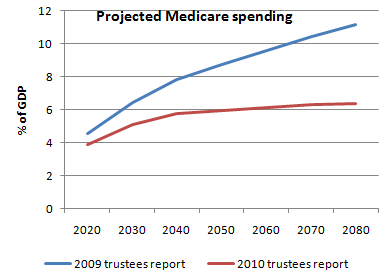In an interview today with Urban Radio Networks, President Obama said the public option "is not the most important aspect of this bill -- the House bill or the Senate bill" and added that only a "few million people" would have benefited from it. The idea, he said, "has just become symbolic of a lot of ideological fights."Here's another DFH kicker. He must be serious . . .
Think Progress: CNBC’s John Harwood tells liberals to ‘lay off the hallucinogenic drugs.’
Late last night, the Senate voted for cloture on health care legislation, paving the way for the bill to be passed by the Senate and then proceeding to a conference committee with the House. When the bills go into conference, many progressives — like former Governor Howard Dean — hope that improvements will be made to the legislation in areas like expanding coverage and instilling greater insurance company accountability. This morning, CNBC’s John Harwood dismissed this constructive criticism as “idiotic” and suggested that those who want to improve the health care legislation should “lay off the hallucinogenic drugs”:
HARWOOD: So much of the commentary that I’ve heard has been really idiotic. Liberals who want universal health care ought to be thanking Harry Reid for getting this done rather than talking about what’s inadequate in the bill. I’m not saying the bill is a good bill. But if you’re a liberal and you want universal coverage in this country, and think that you can do better, that Harry Reid can do better than he’s done that the White House can do better, they ought to lay off the hallucinogenic drugs because we’ve had a vivid demonstration of the limits of political possibilities on this issue.
Watch it:
Krugman: Down memory lane
Many progressives are deeply dismayed about the shortcomings of the Senate bill. And they should hold onto that feeling! History suggests that this reform will get much better over time — but only if people keep demanding improvements.
But I think my reaction to the bill’s apparently imminent passage is being shaped, in part, by memories of how it was, not long ago. Five years ago, after the 2004 election, I was devoting most of my efforts to an attempt to stop Social Security privatization. And it seemed likely to be yet another losing battle: all the wise heads, all the makers of conventional wisdom, were sure that Bush was going to get what he wanted, and that people like me were just boorish obstructionists unwilling to embrace change.
But Social Security survived. And here we are now with a reform that, for all its faults, is the biggest expansion of the social safety net since Medicare. That, in my book, counts as a big victory.
1.) Ezra Klein-
Thanks to the magic of Google, it’s easy enough to revisit the plan (pdf) Obama campaigned on in light of the plan that seems likely to pass. And there are, to be sure, some differences. The public option did not survive the Senate. The individual mandate, which Obama campaigned against, was added after key members of Congress and the administration realized that the plan wouldn’t function in its absence. Drug reimportation was defeated, and a vague effort to have government pick up some catastrophic costs was never really mentioned.***But whether you love the Senate bill or loathe it, whether you’re impressed by Obama’s effort or disappointed, it is very hard to argue that the bill Congress looks likely to pass is fundamentally different from the approach Obama initially advocated. “The Obama-Biden plan both builds on and improves our current insurance system,” the campaign promised, and on that, for better or for worse, they’ve delivered. You can debate whether Obama should have lashed himself to such an incremental and status-quo oriented approach, but you cannot argue that he kept it a secret.
There’s a lot of dismay/rage on the left over Obama, a number of cries that he isn’t the man progressives thought they were voting for.Politifact:But that says more about the complainers than it does about Obama himself. If you actually paid attention to the substance of what he was saying during the primary, you realized that
(a) There wasn’t a lot of difference among the major Democratic contenders
(b) To the extent that there was a difference, Obama was the least progressiveNow it’s true that many progressives were ardent Obama supporters, with their ardency mixed in with a fair bit of demonization of Hillary Clinton. And maybe they were right — but not on policy grounds. (I still remember people angrily telling me that if Hillary got in, she’d fill her economics team with Rubinites).
So what you’re getting is what you should have seen.
There have definitely been compromises, and there have been letdowns. There have been mistakes, and there have been broken promises. I’m not thrilled with the slow pace of Gitmo, I’m not thrilled about any number of things, but I see slow progress. But there have also been unrealistic expectations- Obama was always a risk averse, cautious, careful person- I remember the many discussions we had here regarding Obama as poker player versus John McCain and his reckless love of roulette, and we used to agree that a cautious poker player who studies the opposition and thinks long ball and treats us like adults was desirable.
I’ve said repeatedly that the only people who really believed that Obama was a left-wing radical were the people on the left who wanted him to be but refused to pay attention and those on the right who wanted to destroy him. I think I’m still pretty right, and it is why I’m not disillusioned. I think my take on the guy was pretty accurate, and still is.
- from the comments:
mr. whipple
But there have also been unrealistic expectations- Obama was always a risk averse, cautious, careful personI would use a more positive term: prudent. I liked that about him, and still do.
I remember watching one of the debates while I was online, and a lot of people wanted Obama to just kick the shit out of McCain and were dismayed when he didn’t. Then the after polls came in, all saying Obama had ‘won’, and they were dumbfounded.
I think on issue after issue people want some old wounds avenged. Don’t just get policy passed, destroy republicans. Don’t just get healthcare, destroy insurance companies. Don’t just get our financial institutions in order, destroy capitalism.
donovong
Looking at that Politifact scoreboard (and I can’t go in-depth on my Blackberry), I can only imagine what it would have looked like with President McCain.
Then I go and do my happy dance again. It’s only been 11 months, people. 7 years and 1 month to go!
Drum: Healthcare Ping Pong?
Should ping pong become the new liberal sport? That is, should the House just skip the conference committee on healthcare reform entirely and simply vote on the bill produced by the Senate? This is, for some reason, known as ping-ponging, even though it doesn't really involve any kind of back and forth. In fact, the whole point is to eliminate the back and forth. But whatever. Is this a good idea?
I suppose institutional pride will prevent the House from agreeing to do this, but at this point I wonder just what they're likely to gain from a conference report? On abortion, the Senate bill is already
betterless atrocious than the House bill, its mandate penalty is smaller, and its defined benefit packages are more flexible.The House bill has several advantages of its own, but among the big ticket items the public option is DOA and the others (somewhat wider coverage and more generous Medicaid expansion) would increase the price of the bill and are pretty clearly unacceptable to the centrist bloc in the Senate. That leaves the funding mechanisms: an excise tax on high-cost healthcare plans and a higher payroll tax on the wealthy in the Senate bill vs. higher income taxes on the wealthy in the House bill.
The excise tax has a sound policy justification, but a big chunk of the liberal constituency dislikes it anyway and I could certainly see a compromise here: raise the limit on the excise tax so it hits only the very richest plans and then combine it with a smaller income tax hike. Maybe that's worth going to conference for. But it's hard to see any other substantial improvements that are likely to come out of it.
So: go to conference and risk another month of squabbling and possible defections? Or take the imperfect Senate bill and get it passed for certain within a few days of returning from recess? Seems like a close call to me, but ping ponging doesn't look like a bad option at this point.
UPDATE: More here on some of the procedural issues. Turns out that ping pong might be more likely than we think thanks to yet more Republican obstruction.
Will the GOP play dirty to the end? Dec. 21: John Stanton, reporter for Roll Call, talks with Rachel Maddow about whether Congressional Republicans intend to continue their obstruction and stall tactics despite the apparent inevitability of the passage of a health reform bill.
Visit msnbc.com for breaking news, world news, and news about the economy
As if to answer Rachel's question . . .
Faughnan: Confirmed: McConnell Will Object to Appointment of Conferees
There's been speculation today that at least one Senate Republican will attempt to derail a health care conference by objecting to the appointment of conferees. Such a move could prevent Democrats from convening a conference committee to reconcile the House and Senate health care bills, and force them to adopt the 'ping pong' strategy. I have confirmed with a Senate Republican leadership source that GOP Leader Mitch McConnell will in fact, object to the appointment of conferees if Democrats attempt it.
According to this source, it is believed that Harry Reid now expects an objection to the move to appoint conferees, and may not even attempt it. If he does, it will be to have one more opportunity to allege Republicans of 'obstruction.' The objection will not eliminate the possibility of a conference; Democrats can resort to a fallback. They can propose a motion to appoint conferees, which is subject to filibuster. It would likely require 3 separate cloture votes to pass the motion to appoint conferees.Thus, if Democrats are willing to spend roughly a week waiting to appoint conferees, they can do so. Otherwise, they will forego a conference and instead resort to ping pong: the House will be forced either to ratify the Senate bill as is, or amend it and send it to the Senate to be approved with changes.Preventing a conference committee likely makes it harder for Democrats to address the bones of contention between the two bills: abortion, the public option, taxation of union health care plans, and the degree of subsidy available for purchase of health care. If the Senate bill is unacceptable to the House, leaders will be forced to open the bill to amendment - but not in a way that threatens 'settled' portions of the package.This adds an unwelcome level of complexity as Democrats hope to preserve skin-of-the-teeth majorities in both House and Senate.




